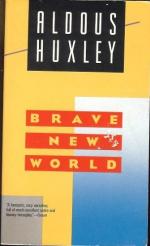|
|
Brave New World Chapter 17
A deep intellectual conversation takes place between Mustapha Mond and The Savage (John). The Savage tells Mond that as World Controller, he has sacrificed art and science for happiness. They have discussed art and science with Helmholtz and Bernard, and now move on to religion. Mond pulls out a copy of the Bible and other religious books and shows the Savage. He tells the Savage that he has "God in the safe and Ford on the shelves." Chapter 17, pg. 231 The Savage asks him why, if he knows about God, he does not tell people about him, and Mond replies that it is the same reason why he does not tell people about Othello: because it is old. Mond reads from two books, one by Cardinal Newman and the other by Maine de Biran, a philosopher. He reads a passage from the first book, which proclaims that we are not our own but the property of God, and that independence is an unnatural state, not made for men. From the second book, he reads a passage about the idea that weakness and fear of old age makes men turn to religion. The author believes that in his own experience, his religious sentiment is a result of the calming of his passions and a turn inward, away from worldly sensations and toward God.
Mond shuts the book. He explains that philosophers did not dream of the modern world, where old age does not exist; youth and prosperity, which now people have right up until the end, have replaced God. There are no losses for which religion must compensate, and youthful desires are unfailing. The Savage asks him if he is an atheist, and Mond says that he believes that there is a God that manifests himself in different ways to different men; now God manifests himself as an absence. The Savage says that it is Mond's fault, and Mond replies it is the fault of a civilization that has chosen science and machinery and universal happiness. They discuss solitude -- the Savage says that he feels God when he is alone, but Mond reminds him that people are taught to hate solitude, and life is arranged so that they almost never have it. The Savage thinks about how he was kept away from communal activities at the Reservation, and now in the World State he is prevented from being alone. The Savage makes a reference, through a quote from Shakespeare's King Lear, challenging Mond that God manages, punishes, and rewards. Mond tells him that the wounded and dying character in King Lear could have been content in the World State with a girl, some sex-hormone chewing gum, and a feely. Mond says, "The Gods are just. No doubt. But their code of law is dictated, in the last resort, by the people who organize society; providence takes its cue from men." Chapter 17, pg. 236
The Savage tells Mond that the man is just as punished with his World State fate as he would be in the other situation, wounded and bleeding to death. Mond reminds him that he must stick to one context, that according to the context of the World State, which is the only context remaining, the man is happy. The Savage tells Mond that the Indians bear things patiently and do not let pleasant vices degrade them, and Mond tells him that they are not Indians, and that men acting on their own would degrade the social order. Mond also rejects the idea of self-denial and chastity, for civilization needs pleasant vices to remain stable. He also rejects the Savage's ideas of nobility and heroism, saying that there is no opportunity for them being that conditions are stable and there are no wars, all thoughts are pleasant, and if not, there is soma.
"There's always soma to calm your anger, to reconcile you to your enemies, to make you patient and long-suffering. In the past you could only accomplish these things by making a great effort and after years of hard moral training. Now, you swallow two or three half-gramme tablets, and there you are. Anybody can be virtuous now. You can carry at least half your mortality about in a bottle. Christianity without tears-that's what soma is." Chapter 17, pg. 238
The Savage declares that life is too easy, that instead of learning to deal with aversive things, they simply have done away with them. He thinks of how they did away with his mother by putting her on soma-holiday. He asks Mond if there is something in living dangerously, and Mond explains the Violent Passion Surrogate treatments, which are mandatory and involve flooding a person's system with adrenin, the physiological equivalent of fear and rage without any of the inconveniences. The Savage says that he likes the inconveniences, the poetry, the danger, the freedom, the goodness, and the sin.
"In fact', said Mustapha Mond, 'you're claiming the right to be unhappy.'
'All right then,' said the Savage defiantly, 'I'm claiming the right to be unhappy.'
'Not to mention the right to grow old and ugly and impotent; the right to have syphilis and cancer; the right to have too little to eat; the right to be lousy; the right to live in constant apprehension of what may happen tomorrow; the right to catch typhoid; the right to be tortured by unspeakable pains of every kind.' There was a long silence.
'I claim them all,' said the Savage at last.
Mustapha Mond shrugged his shoulders. 'You're welcome,' he said." Chapter 17, pg. 240




